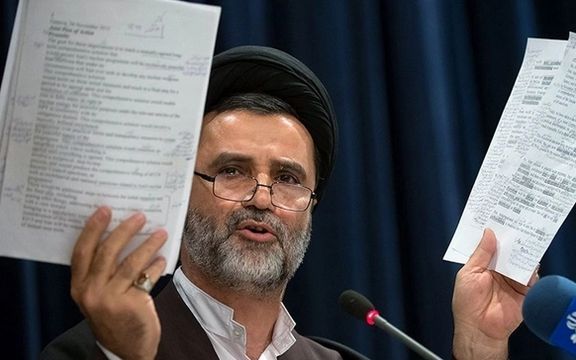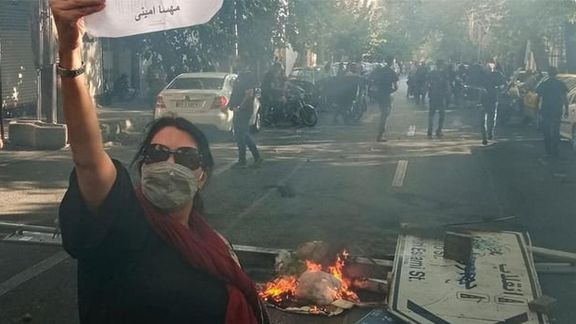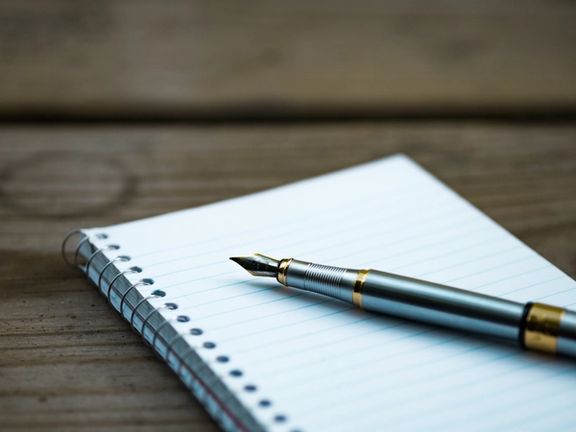Several Foreigners Reported Missing In Iran Amid Turmoil

Amid nationwide unrest and widespread arrests, several foreigners visiting Iran have disappeared, confirming earlier reports that the Islamic Republic is taking foreign citizens hostage.

Amid nationwide unrest and widespread arrests, several foreigners visiting Iran have disappeared, confirming earlier reports that the Islamic Republic is taking foreign citizens hostage.
Australian academic Kylie Moore-Gilbert, who was jailed in Iran for over 800 days from 2018 to 2020, said on Monday she “can confirm that the two New Zealand travel bloggers, Topher Richwhite and his wife Bridget Thackwray of 'Expedition Earth,' are missing, believed to be arrested in Iran.”
She added that it has been about three months since Topher and Bridget went missing, adding that the Islamic Republic has arrested more than a dozen foreigners in the past six months alone.
"Quiet diplomacy never works to the detainee's advantage in such cases,” she said, calling on New Zealand’s media to “make some noise” about it.
Earlier in the day, The Associated Press reported that a Spanish man trekking from Madrid to Doha for the 2022 FIFA World Cup has not been heard from since the day after he crossed into Iran three weeks ago.
The experienced trekker, a former paratrooper and fervent soccer fan, 41-year-old Santiago Sánchez, was last seen in Iraq after hiking through 15 countries. He had been extensively sharing his journey on a popular Instagram account over the last nine months before he entered Iran, stirring fears about his fate.
The Islamic Republic claims it has detained over a dozen foreign nationals since the current wave of protests began, and authorities keep repeating that the turmoil is incited by other countries.

The Islamic Republic’s hardliner Judiciary began the first court hearings for detained protesters, as more nationwide demonstrations are planned for Wednesday.
The courts have indicted at least 201 detained protesters behind closed doors on October 24, Rouydad24 news website in Tehran reported. Citing the Islamic Republic's Supreme Leader Ali Khamenei, Hossein Fazeli the chief of Alborz Province Justice Administration charged that some of those detained are the agents of the Islamic Republic's enemies, adding that others are either sympathize with the enemies or took part in the protests as an emotional reaction.
As in past cases, the regime blames foreigners for organizing the protests, denying any political responsibility for social restrictions and the prevailing economic crisis. On the contrary, it says the United States and its allies planned the uprising because the Islamic Republic was having great success in all arenas.
Fazeli said that the 201 who were indicted had encouraged others to take part in the "riots." He also accused some other protesters of taking their orders from foreign intelligence agencies, an incriminating charge that could entail death sentence for the detainees.
Meanwhile, hardliner cleric Mahmoud Nabavian, who is a member of the ultraconservative Paydari Party has said in Tehran, without providing any evidence, that BBC Persian and Iran International TVs that beam news and current affair programs into Iran via satellite are the commanders of the protests in Iran.

He also said, again without presenting any evidence, that one of the protesters in Iran carried 10 billion rials of Iranian currency ($31,000) during the demonstrations and offered cash to protesters who chanted anti-regime slogans.
Nabavian reiterated that foreigners incited the "riots" with the aim of making Iran insecure.The clerics comments contradict remarks by some Iranian politicians and political activists who have said over and over that it was the government’s misguided policies, mismanagement, imposition of unpopular social restrictions and attempts to lie about Mahsa Amini’s death that triggered the protests. Amini was killed violently in hijab police custody, which triggered the first protests on September 16.
In another development, ultraconservative lawmaker Javad Kariomi Qoddousi claimed that Iran International TV knew about last week's fire at the Evin Prison, mindless of numerous reports that said prison officials knew about the fire from a few days earlier and they had given furloughs to some regime insiders who happened to be jail on corruption or murder convictions.
At the same time, the 40th day of Mahsa Amini’s death approaches on Wednesday and nationwide protests are scheduled.
Protest gatherings are gaining momentum in various cities according to reports. The 40th day mourning is not customary in the Sunni populated province of Kurdistan where the young woman came from, however, Shiite protesters are adamant to hold their custom as a sign of respect for the victim of police brutality.
Meanwhile, protests have been taking place non-stop since mid-September in Mahsa's hometown Saqqez in the Kudish province of Kordestan. At the same time, the north-eastern city of Tabriz has been the venue of major protests consisting of smaller gatherings at numerous spots across the city.
Protests took place in several western Iranian cities and town Monday evening, including Orumiyeh (Urmia), a mixed Azari and Kurdish city. The two linguistic groups who had some tensions in the past have issued statements of mutual support to overthrow the clerical regime.

US Special Envoy for Iran, Rob Malley told Iran International Monday that a tweet he sent on Iran protests, which led to negative reactions, “was poorly worded.”
“It is not up to me; it is not up to the US government what the brave women and men who have been demonstrating in Iran want. It is up to them,” Malley told our correspondent Samira Gharaei.
In a tweet earlier on Sunday he had said that Iranians were protesting to have the Islamic Republic “respect their human rights and dignity.”
Iranian activists objected to this sentence, saying Iranians have proven in the past five weeks that they reject the clerical regime and want a new, democratic government and not respect from an oppressive regime.
Malley went on to say in his interview that what the Biden Administration has been doing is voicing as strong a support as possible “for the fundamental rights of the Iranian people.”
Asked about calls by some Iranians for him to resign, Malley said, “There always would be criticism of what we do…but we’re gonna do what we can to support fundamental rights of the Iranian people. That’s what I’m here to do and will continue doing.”
Asked to comment on what is the US government’s assessment about why Iranians are protesting and what is their goal, Malley avoided a clear answer, saying, “That is not up to us to decide…the Iranian people will make clear why they are angry at the regime…but they will speak for themselves.”
The Biden Administration indirectly negotiated with Tehran for 17 months to revive the Obama-era nuclear deal known as the JCPOA. Many Iranian Americans who have been galvanized and mobilized by the protests feel that the administration might be hesitating to recognize the movement as one that rejects the Islamic Republic and aspires to replace the regime with a democratic form of government.
Although the administration has said that it is “not focused” on the nuclear talks anymore and is trying to help the Iranian people, some are still concerned that the shift might be just temporary and the US might sign a new nuclear deal with Iran, which would release tens of billions of dollars to an authoritarian government that will use the money to suppress the protests.
But Malley emphasized that the Biden team is determined to impose sanctions on Iranian officials who are responsible for violence against the people and reiterated that more designations are on the way.
More US sanctions will further reduce the chances for a deal, as Tehran has already demanded older non-nuclear sanctions to be removed as a pre-condition.
But the lead US diplomat on Iran made it clear that Washington has not been in touch with Tehran despite claims by Iran’s foreign minister that the negotiations are ongoing with messages being exchanged.
“Right now, our message would be; number one, stop killing your own people, and number two, stop providing weapons to Russia to kill innocent Ukrainians.”
The US, its European allies and Ukraine say that Russia is using Iranian supplied drones to attack civilians and civilian infrastructure in Ukraine. Already, both US and European countries have announced sanctions related to the drone issue.
Malley also reiterated that the “JCPOA is not on the agenda right now” and the US is focused on the brutal crackdown by the Iranian regime on its people and its supply of drones to Russia that are used against civilians.

People in a Tehran district took to the street and clashed with security forces after two schoolgirls were reportedly assaulted by the principal of a school Monday.
Social media users say one of the girls was shoved against the wall by one of the staff at the school at Karoun Street in southwestern Tehran when she and her classmates protested to humiliating body searches for mobile phones and the other was injured at a later stage when security forces were called in by the school to stop the students’ protest and chanting.
Reports say the principal had forced the girls to strip down to their underwear to search for their cell phones and the children tried to resist the body search and started chanting against her.
An ambulance arrived later and took both girls to Loghman Hospital nearby. These reports also claim that one of the girl injured by the principal had a seizure and is in hospital in critical condition.

People gathered outside the school and chanted after parents were informed by children and rushed to the school to collect them. Neighborhood shops shut down and trash bins were set on fire on the street by chanting locals. According to some social media reports a number of the children were still trapped inside the school hours after the incident.
An official from Education Ministry said a groups of students and parents have “clashed with the school principal due to the principal's insistence on inspecting girls for cellphones.”
“No student died in this incident. some students experienced a drop in blood pressure, but the EMS took care of the situation,” added this official.
A video on social media shows over a dozen riot police in front of the school beating up some of the angry parents.
Another video shows a group of parents in front of the school while an ambulance is parked outside the courtyard.
Witnesses say on social media that security forces used paintball guns and shotgun birdshots to disperse the protesters.
In another video security forces fired tear gas forcing the shopkeepers to close their stores and stay inside.
Some other reports also suggest that the lights in the streets around the school have been turned off.
According to eyewitnesses, security officers were shooting at the windows of houses and cars in the area.

More than 600 Iranian authors, poets, and civil rights activists issued a statement Sunday in protest to the Islamic Republic’s arrest of artists and writers, demanding their release.
Noting that the country is on the brink of “collapse,” they said the situation is so grave that citizens, even children and teenagers, do not feel safe anymore.
Rejecting the entirety of the clerical regime, they said they don't find anything negotiable “from the top to the bottom” of the Islamic Republic.
They also expressed concerns about the lives of their fellow writers, journalists, and artists who have been detained throughout the country since the start of the current wave of the protests, ignited by the death in custody of 22-year-old Mahsa Amini.
The signatories added that they hold the government directly responsible for whatever happens to members of the literary community, and demanded their unconditional and immediate release.
They also decried the government’s shutting down of the internet to prevent the news of their atrocities reaching the world.
Earlier on Sunday, a number of intellectuals from the Arab world also called for international pressure against the Islamic Republic to release its detained scholars, civil and political activists from Iranian prisons.

Antigovernment protests and strikes are simmering across Iran with bouts of tensions reported from universities whose students have been tearing down segregation walls of dining areas.
On Monday, protesting students at Tehran’s Khaje-Nasir Toosi University of Technology booed Iranian government spokesman Ali Bahadori Jahromi and did not let him deliver his speech, with chanting berating slogans against the regime.
They chanted slogans such as "We don't want murderers to be our guest," and “This is the year of blood, Seyyed Ali (Khamenei) will be gone,” forcing the spokesman to leave his speech unfinished. "I feel that if I am not here, the insults may not continue. Let's schedule the meeting for another time," he said.
Videos posted on social media showed some students at Sharif University trying to break locked doors and barriers set up by IRGC-affiliated Basij forces at the entrance of the university's cafeteria. In a symbolic move, some other male and female students sat down on the ground at the campus and ate together.
Students at Hamadan University held a gathering in honor of their classmate Negin Abdolmaleki, 21, who was beaten to death by security forces on October 12.
Authorities have urged her roommates to say she died of eating expired canned tuna, sources said.
Several other campuses across the country were scenes of protests with students chanting antigovernment slogans or the main motto of the current wave of protests: Women, Life, Liberty.